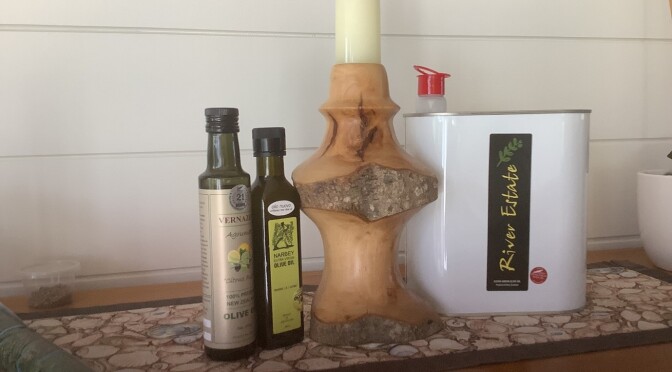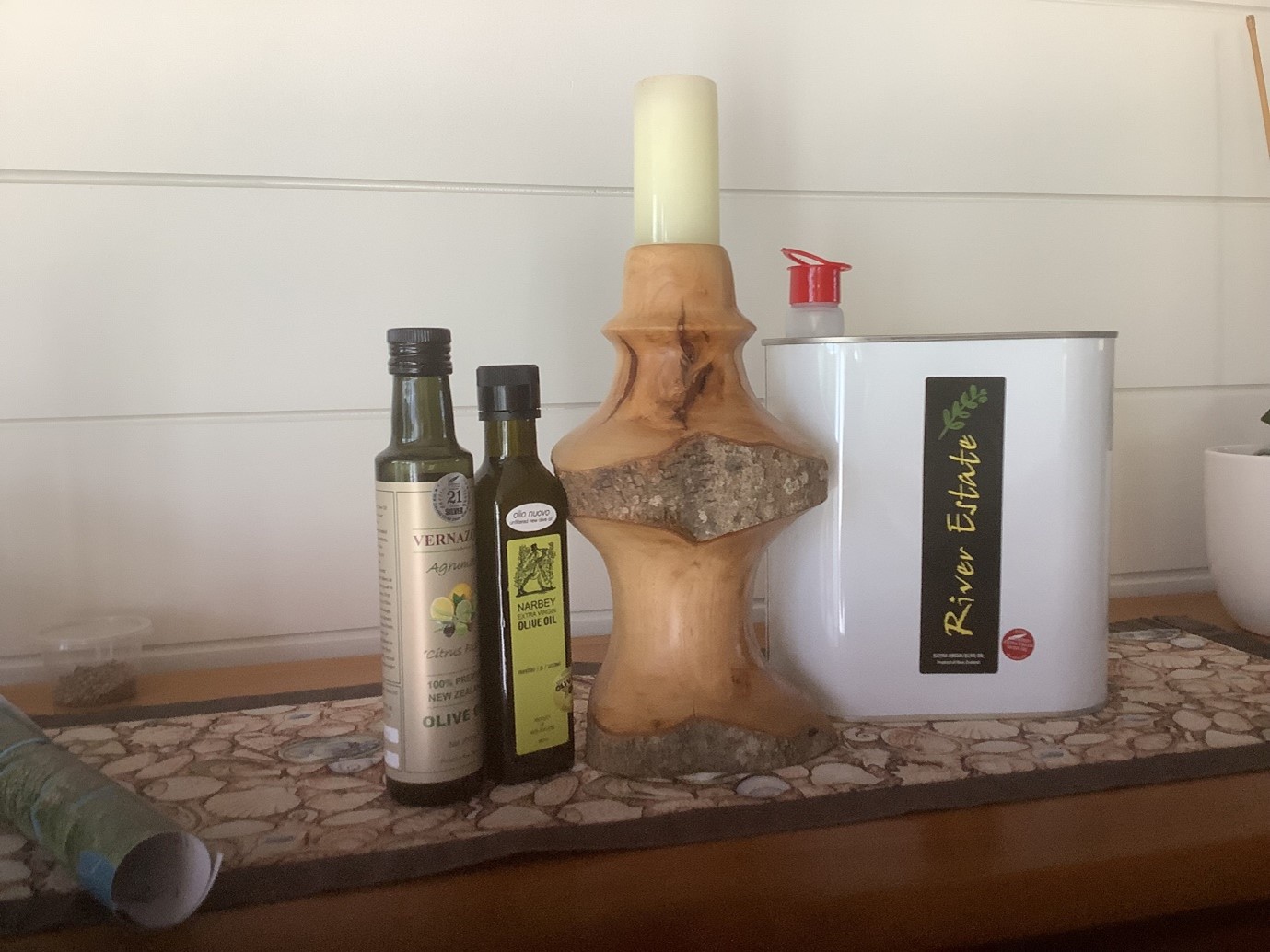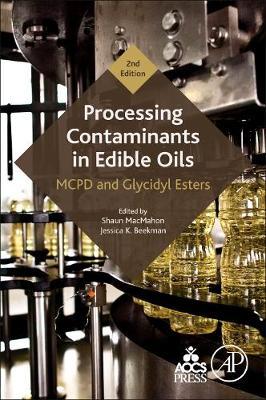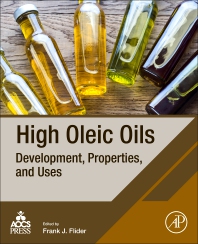Oils and Fats update
Laurence Eyres FNZIFST
April 2022
Avocado powder (Ovavo)
There is a new kid on the block in the functional fat/ingredient space. Freeze dried avocado powder has just been launched in New Zealand.
Containing around 70% oil. The balance being fibre, carbohydrate, and protein, it is a versatile consistent ingredient for use in a multitude of food products. New Nutrition Business has written a whole article about it and Plant and Food, and Massy have had input into the technology and nutrition of the product. Samples for development are available from the company.
Andrew Vivian General Manager OVĀVO P: +64 21 0262 7472 E: hello@ovavo.nz 1953 Far North Road, Waiharara, Northland
Northland Olive Oil
At Olivetti ‘s recent AGM a lovely candlestick from an olive tree was presented to the retiring Judge. Shown are some of the recent prize- winning oils. These days of lovely quality Extra Virgin olive oils are a far cry from the early days of the industry, with nearly all producers having excellent oils most of whom receive a medal at the annual judging.
Lutein and zeaxanthin for eye health
Relevant for this reviewer who has had a cataract removed and has macular degeneration. Very common for over 65 years.
Certain xanthophyll (oxygen-containing) carotenoids are highly concentrated in the light-exposed structures in plants and in the human retina. These carotenoids include lutein (L), its structural isomer zeaxanthin (Z), and meso-zeaxanthin (meso-Z), a lutein metabolite and zeaxanthin stereoisomer . L and Z are widely distributed in nature and are common in plants. Animals do not synthesize carotenoids. In primates, dietary L and its isomers are selectively concentrated in the visual system (eye and brain) over other carotenoids in the blood, comprising 80% to 90% of carotenoids in human eyes and most carotenoids in the brain. They are the exclusive carotenoids in the neural retina and lens.
A minimum concentration of lutein/zeaxanthin intake is associated with a statistically significant and/or clinically important change in macular pigment optical density (MPOD) among adults with healthy eyes.
Two reviewers screened results to identify studies that evaluated supplements or dietary sources of lutein/zeaxanthin on MPOD among adults with healthy eyes. One reviewer extracted data and assessed strength of evidence, which was confirmed by a second reviewer. Two independent reviewers assessed the risk of bias. There was no statistically significant change in MPOD among studies evaluating <5 mg/d of total lutein/zeaxanthin intake. Among studies evaluating >= 20 mg/d of lutein/zeaxanthin for 3-12 months, MPOD increased with lutein/zeaxanthin intake, particularly at higher doses, among adults with healthy eyes.
Monounsaturated oils avocado and olive increase bioavailability of carotenoids
Bioavailability is defined as “the fraction of an ingested nutrient that is available for utilization in normal physiological functions or for storage.” Available studies on carotenoids bioavailability are based on the measurement of their levels in serum or plasma. Dietary components were reported to affect the rate of carotenoids absorption. On digestion, carotenoids are incorporated into the lipid phase and then are emulsified into small lipid droplets. The nature and amount of lipids in the diet affect the emulsification, secretion of bile salts, and formation of mixed micelles all of which are currently important subjects to understand the carotenoids bioavailability. Specific lipids, vegetable oils and their fatty acid moiety have been shown to affect the mixed micelles formation that positively influences the absorption of carotenoids. Oleic acid micelles and olive oil (oleic acid, C18:1) enhance the intestinal accessibility of carotenoids more than linoleic acid micelles or vegetables oils rich in polyunsaturated fatty acids (PUFA). Food Oil Fraud
Extra virgin olive oil’s high economic value and acclaim as a healthy product have made it a popular target of fraud, researchers from several European universities and institutions said in a joint review.
Along with other food products, including fish, milk, meat, grains, honey, coffee, wine and spices, olive oil is often the target of various illicit practices in the European Union.
The level of attention and the high request in terms of conformity checks have currently improved the quality of the olive oil sold in the market in the last 30 years. -
The researchers reviewed the emerging trends in olive oil fraud in the E.U. and other countries as part of the European Commission’s Oleum program.
See Also: Dr. Gundry’s Olive Oil: Controversial Pitchman Peddles a Dose of Deception
The researchers gathered data from the Joint Research Center (JRC), the internal scientific service of the European Commission, and several food fraud databases, such as the E.U. ‘s RASFF system. They also sent surveys to professionals and other members of the olive oil sector.
Between September 2016 and December 2019, the JRC recorded 32 cases of fraud in the global olive oil industry.
- Sixteen of the cases involved the substitution of olive oil with other oils.
- Eleven cases concerned the mislabelling of olive oils.
- Four cases involved the false use of a geographical indicator.
- Five cases concerned the distribution of counterfeit products.
- Six related to the dilution of olive oils with other oils or inferior grades.
- One case involved theft.
Twenty of the 32 cases occurred in Europe. The most common infringement practices were marketing virgin olive oil as extra virgin and selling blended olive and vegetable oils as pure olive oil.
In countries outside of the E.U., olive oil fraud usually included dilution and substitution of oils.
For example, in Brazil, the mixing of olive oil with lampante or soybean oil was the most common fraudulent practice.
Further examples of fraud identified by the report included a 2017 incident in which only six of the 35 sampled extra virgin olive oils sold in Danish supermarkets were extra virgin.
In Greece, on the other hand, the police arrested seven people and charged them with adding green dye to sunflower oil and marketing it as olive oil.
In Spain, the world’s largest olive oil cooperative was fined in 2018 for failing to pay the tariffs on imported olive oil from Tunisia, which was then blended with lower quality olive oil and exported to the United States as virgin olive oil.
Professor Selina Wang of UC Davis has published papers on fraudulent olive oil and avocado oil in the USA.
New AOCS books
Processing Contaminants in Edible Oils - MCPD and Glycidyl Esters
2nd Edition – January 25, 2022
Editors: Shaun Macmahon, Jessica Beekman
Awaiting a review
High Oleic Oils,
Edited by Frank Flider
November 2021, ISBN 9780128229125, List $200, AOCS Member $140




